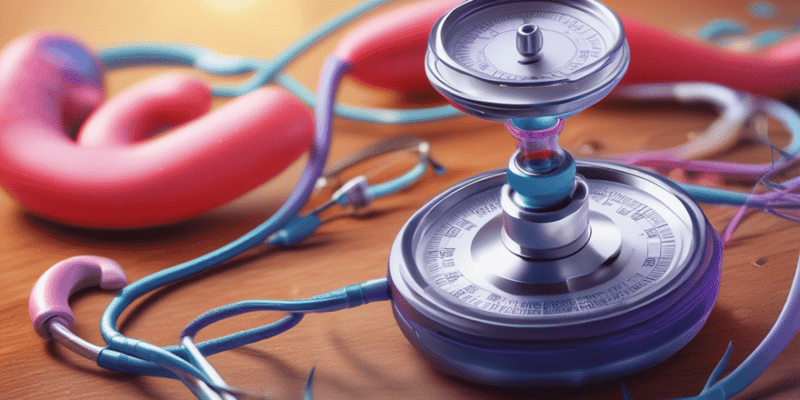Podcast
Questions and Answers
What is the primary mechanism of action of thiazide diuretics?
What is the primary mechanism of action of thiazide diuretics?
Which of the following conditions should prompt cautious use of thiazide diuretics?
Which of the following conditions should prompt cautious use of thiazide diuretics?
What potential risk associated with thiazide diuretics can lead to serious complications?
What potential risk associated with thiazide diuretics can lead to serious complications?
What advice should be given to patients taking thiazide diuretics regarding monitoring?
What advice should be given to patients taking thiazide diuretics regarding monitoring?
Signup and view all the answers
What effect do thiazide diuretics have on calcium levels in the body?
What effect do thiazide diuretics have on calcium levels in the body?
Signup and view all the answers
Which thiazide-like drug is known for its effectiveness in treating hypertension and is often compared to thiazide diuretics?
Which thiazide-like drug is known for its effectiveness in treating hypertension and is often compared to thiazide diuretics?
Signup and view all the answers
What is a significant side effect associated with thiazide diuretics that healthcare providers should monitor in diabetic patients?
What is a significant side effect associated with thiazide diuretics that healthcare providers should monitor in diabetic patients?
Signup and view all the answers
How do thiazide diuretics primarily exert their effects in the renal system?
How do thiazide diuretics primarily exert their effects in the renal system?
Signup and view all the answers
Which electrolyte imbalance should be of particular concern for patients on thiazide diuretics?
Which electrolyte imbalance should be of particular concern for patients on thiazide diuretics?
Signup and view all the answers
What nursing consideration is important for patients prescribed thiazide diuretics to prevent potential falls?
What nursing consideration is important for patients prescribed thiazide diuretics to prevent potential falls?
Signup and view all the answers
Study Notes
Thiazide Diuretics: Study Notes
-
Types:
- Thiazides: Hydrochlorothiazide (HCTZ), Chlorothiazide
- Thiazide-like drugs: Indapamide, Chlorthalidone, Metolazone
-
Mechanism of Action:
- Blocks sodium and chloride reabsorption in the distal convoluted tubule
- Increases excretion of sodium and chloride in urine
- Water follows electrolytes, increasing urine output
- Requires functioning kidneys
-
Clinical Uses:
- Hypertension: First-line treatment; lowers blood pressure by decreasing blood volume
- Edema: Treats peripheral edema from heart failure, liver failure, or kidney disease
- Heart Failure: Reduces blood volume and workload on the heart
- Kidney Stones: Retains calcium, potentially reducing calcium-based stone formation
-
Important Considerations for their use:
- Risk of allergic reactions in patients with sulfa allergies.
-
Side Effects:
-
Electrolyte Imbalances:
- Hypokalemia (low potassium): Encourage high-potassium diet and use caution with digoxin
- Hyponatremia (low sodium): Use lithium with caution; monitor for toxicity
- Hypercalcemia (high calcium): Retains calcium
- Hypomagnesemia (low magnesium)
-
Other possible side effects:
- Hyperglycemia (high blood sugar): Monitor blood glucose, especially in diabetics.
- Hyperuricemia (high uric acid): Increased gout risk.
- Hypercholesterolemia: Monitor cholesterol levels
- Hypotension: Risk of orthostatic hypotension, educate patients on slow position changes
- Dehydration: Encourage fluid intake
- Photosensitivity: Advise use of sunscreen
-
Electrolyte Imbalances:
-
Nursing Considerations:
- Daily weights: Monitor fluid balance.
- Timing of Administration: Best administered early in the day to avoid nocturia.
Multiple Choice Questions and Answers
-
Question 1: Which is a thiazide diuretic?
- Answer: Hydrochlorothiazide (HCTZ)
-
Question 2: What is the MOA of thiazide diuretics?
- Answer: Block sodium and chloride reabsorption in the distal convoluted tubule.
-
Question 3: Common clinical use of thiazide diuretics?
- Answer: Hypertension
-
Question 4: Common side effect of thiazide diuretics?
- Answer: Hypokalemia
-
Question 5: Caution for thiazide use?
- Answer: Diabetes
-
Question 6: Effect on calcium levels?
- Answer: Retains calcium
-
Question 7: What should patients monitor?
- Answer: Daily weights
-
Question 8: Potential risk from thiazide diuretics?
- Answer: Hyponatremia
-
Question 9: Best time to administer thiazide diuretics?
- Answer: Early in the morning
-
Question 10: Nursing consideration for thiazide diuretics?
- Answer: Encourage high potassium intake and monitor for fluid imbalance
Studying That Suits You
Use AI to generate personalized quizzes and flashcards to suit your learning preferences.
Description
Explore the comprehensive study notes on thiazide diuretics, including their types, mechanisms of action, clinical uses, and important considerations. Understand the side effects and implications of their use in treating conditions such as hypertension and heart failure.


